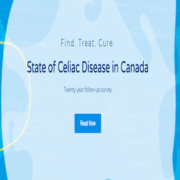Study Urges Universal Screening for Celiac Disease in Children
 Autoimmunity Screening for Kids (ASK) discovered a high prevalence of undiagnosed CD autoimmunity, particularly in those without a family history of CD or symptoms. Universal screening seems to be the only way to detect all cases of CD and has the potential to reduce diagnostic delay and associated morbidity.
Autoimmunity Screening for Kids (ASK) discovered a high prevalence of undiagnosed CD autoimmunity, particularly in those without a family history of CD or symptoms. Universal screening seems to be the only way to detect all cases of CD and has the potential to reduce diagnostic delay and associated morbidity.
- American Journal of Gastroenterology 1
BACKGROUND
Celiac disease (CD) is a common gluten-mediated autoimmune enteropathy estimated to affect up to 2%–3% of the adolescent population in Colorado.
Current guidelines recommend screening for CD with tissue transglutaminase autoantibodies (TGA) testing in symptomatic individuals and asymptomatic individuals with high-risk features based on a family history of CD, concurrent autoimmune diseases such as type 1 diabetes, and particular genetic syndromes.
Although classic gastrointestinal symptoms and signs such as diarrhea, abdominal distension, vomiting, and malabsorption commonly prompt evaluation for CD, the non-classic and subclinical presentations are often overlooked.
In fact, over half of individuals may be asymptomatic at presentation and, therefore, may not be identified by the current recommendations for serologic screening.
Specifically, in an international prospective cohort study of children at genetic risk for CD—The Environmental Determinants of Diabetes in the Young study—the presence of symptoms was a poor predictor of CD autoimmunity.
The difficulty of identifying cases based on the presence of symptoms contributes to diagnostic delay that may be over 10 years on average.
This diagnostic delay has a negative impact on both the patient’s overall health and healthcare utilization. Untreated CD may lead to significant morbidity including osteoporosis, growth stunting, infertility, neuropathy, and gastrointestinal lymphomas .
Although CD meets many of the World Health Organization criteria for a chronic disease that should be considered for universal screening, screening for CD in asymptomatic persons remains controversial.
Although treating individuals with symptomatic CD has clear benefit, the natural history of asymptomatic, screening-detected CD regarding its associated morbidities remains largely unknown.
Limited studies have suggested that untreated asymptomatic CD autoimmunity may negatively affect growth and bone health. However, the risk of morbidity must also be balanced with the cost of screening and the social and economic burden of a gluten-free diet.
Although general pediatric population screening studies have been reported from Europe, to our knowledge, the Autoimmunity Screening for Kids (ASK) is the first large scale pediatric screening study in the United States.
ASK screens children simultaneously for CD and type 1 diabetes. The overall objective of the ASK program is to raise awareness of the importance of type 1 diabetes and CD in the community and to reduce the morbidity of delayed diagnosis associated with these conditions.
It will also assess the harms and benefits of a mass screening approach.
Here, we report the study design and preliminary screening results for CD in the initial 9,973 children screened between January 2017 and July 2018. The screening results for type 1 diabetes will be reported separately.
INTRODUCTION:
The Autoimmunity Screening for Kids (ASK) study is a large scale pediatric screening study in Colorado for celiac disease (CD) and type 1 diabetes. This is a report of the CD outcomes for the first 9,973 children screened through ASK.
METHODS:
ASK screens children aged 1–17 years for CD using 2 highly sensitive assays for tissue transglutaminase autoantibodies (TGA): a radiobinding (RBA) assay for IgA TGA and an electrochemiluminescence (ECL) assay that detects all TGA isotypes. Children who test positive on either assay are asked to return for confirmatory testing.
Those with a confirmed RBA TGA level ≥ 0.1 (twice the upper limit of normal) are referred to the Colorado Center for Celiac Disease for further evaluation; all others are referred to primary care.
RESULTS:
Of the initial 9,973 children screened, 242 children were TGA+ by any assay.
Of those initially positive, 185 children (76.4%) have completed a confirmation blood draw with 149 children (80.5%) confirming positive by RBA TGA.
Confirmed RBA TGA+ was associated with a family history of CD (odds ratio [OR] = 1.83; 95% confidence interval 1.06–3.16), non-Hispanic white ethnicity (OR = 3.34; 2.32–4.79), and female sex (OR = 1.43; 1.03–1.98).
Gastrointestinal symptoms of CD, assessed at the initial screening, were reported equally often among the RBA TGA+ vs TGA− children (32.1% vs 30.5%, P = 0.65).
DISCUSSION:
The initial results of this ongoing mass-screening program confirm a high prevalence of undiagnosed CD autoimmunity in a screened US population. Symptoms at initial screening were not associated with TGA status.
CONCLUSIONS:
- ASK aims for the eventual implementation of a mass autoimmune screening program that would be feasible in the primary care setting.
- In this initial report, we find a high prevalence of undiagnosed CD autoimmunity in a screened US population.
- Most screening-identified children do not have a family history of CD (∼90% without) or symptoms (∼70% without) at the time of screening.
- Universal screening seems to be the only way to detect all cases of CD and has the potential to reduce diagnostic delay and associated morbidity.
A longer follow-up period is needed to properly assess the costs of screening and the effect on morbidity and quality of life of screening-identified children and families.












